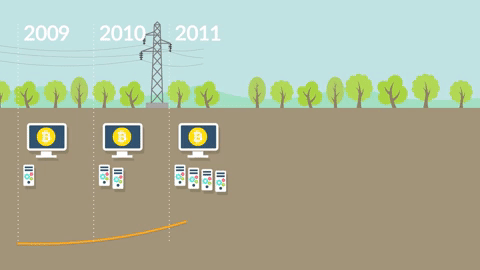Blockchain Transactions and CC production costs

Cryptocurrencies (CC) have been hailed as revolutionary economic disruptors, powered by an unknown number of decentralized server farms manned by an unknown number of crypto ‘miner’ machines working around the clock to produce more transactions, that are confirmed and protected on the distributed global ledger known as the ‘blockchain’.
The environmental impact of such huge processing requirements has yet to be fully accounted for, however, current global blockchain & cryptocurrency mining has surpassed the energy consumption of the Republic of Ireland.
Cryptocurrency mining can be performed by single devices, but is more often done in farms comprising hundreds if not thousands of machines, crunching numbers and performing immense calculations required to complete a new “block” of code in the cryptocurrency transaction chain, with ±$80,000 in bitcoin as a reward.

The baseline energy cost (in megajoules or MJ) to produce one dollar’s worth of: bitcoin (17MJ), ethereum (7MJ), litecoin (7MJ) and monero (24MJ). These figures amount to almost three times the energy needed to excavate the same dollar value of gold (5MJ), platinum (7MJ) or copper (4MJ). Only aluminium (122MJ) was more energy intensive.
Adopting bitcoin on a society-wide basis could raise global temperatures by two 2°C in just 15 years, according to a new study. The electricity generated for the cryptocurrency-mining in 2017 by power plants, resulted in an emission of 69 million metric tons of CO2, the same as the average capacity of 15 coal-fired power plants.
Records of cryptocurrency transactions are kept on a digital ledger. The average transaction costs of a cryptocurrency transfer are about $50. Would you buy a $3 coffee and pay another $50 for the digital transaction?

To process via blockchain the number of digital retail transactions that are currently handled by selected national retail payment systems, the size of the ledger would swell well beyond the storage capacity of a smartphone in a matter of days, beyond that of a personal computer in a matter of weeks and beyond that of servers in a matter of months.
Thus, only quantum computers could keep up with verification of blockchain type of transactions. The needed communication volumes would bring the Internet to a halt, as millions of users exchanged files the size of one terabyte each.
Bitcoin, however, is uniquely designed such that the number of Bitcoins given in reward for the electric-intensive task halves every few years, and the complexity of calculations is dynamically adjusted to compensate for the growing computing power. At the set rate, all 21 million Bitcoins will be extracted by 2140, by which point humanity will be long extinct, if these researchers are correct.
